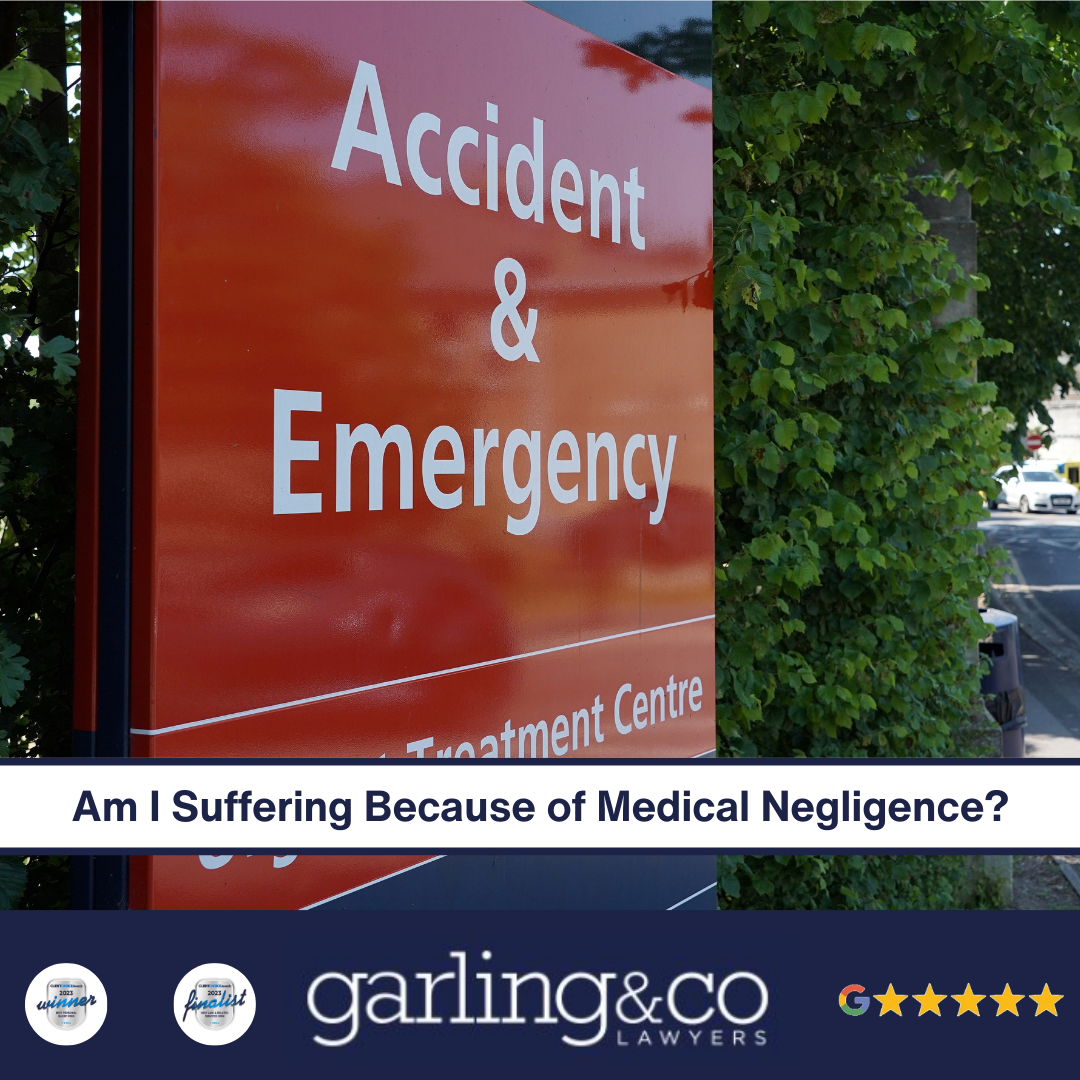
What is medical negligence?
Medical negligence, also known as medical malpractice, occurs when a healthcare professional fails to provide reasonable care to a patient, resulting in permanent or significant injury or harm to the patient. This can include errors in diagnosis, treatment, or aftercare management. To establish medical negligence, the patient must prove that the healthcare provider’s failure to provide them with reasonable care is what caused the injury or harm and that it would have been avoided if the healthcare provider had provided them with reasonable care.
Examples of medical negligence
-
Errors of diagnosis
Diagnosis errors include both misdiagnosis and a delay in diagnosis. Misdiagnosis occurs when a healthcare professional fails to correctly diagnose a medical condition and makes an incorrect diagnosis. This can lead to inappropriate treatments, unnecessary medications, and delayed recovery or worsening of the patient’s condition. A delay in diagnosis usually occurs because of a failure to appreciate the significance of a patient’s symptoms and refer the patient for appropriate investigations. A delay in diagnosis often results in a delay in treatment, which in turn results in poor patient outcomes due to worsening or progression of the patient’s undiagnosed condition or disease.
-
Surgical errors
Surgical errors can range from operating on the wrong body part to leaving surgical instruments inside the patient’s body. Some surgical mishaps occur due to a failure by the operating doctor to take reasonable care during the procedure or not taking all the necessary precautions to identify and protect internal organs, nerves, and blood vessels near the operating field. These errors can cause severe complications, infections, and even death.
-
Medication errors
Medication errors include prescribing the wrong medication, incorrect dosage, or administering medication to which the patient is allergic. These errors can cause adverse reactions, overdose, or inadequate treatment due to the ineffectiveness of the prescribed medication.
-
Birth injuries
Birth injuries can occur during labour and delivery due to negligence on the part of the obstetric or midwifery team. Examples include failure to monitor the baby’s heart rate during the mother’s labour, improper use of forceps, or delayed Caesarean section. Birth injuries can also occur because of a failure to appreciate abnormalities during the antenatal period and a failure to offer an elective Caesarean section to the mother. These injuries can lead to lifelong disabilities or even death of the child.
The impact of medical negligence on patients
Medical negligence can result in various physical consequences, including pain, disability, or the worsening of a pre-existing condition. In severe cases, medical negligence can even cause death.
The emotional and psychological impact of medical negligence can be profound. Patients may experience anxiety, depression, loss of trust in healthcare providers, and a fear of seeking medical care in the future. At times, a psychological injury could be so severe that it results in debilitating symptoms that impact all aspects of a person’s life including their capacity to work, ability to attend to activities of daily living and of course, their quality of their life.
Medical negligence can also lead to financial burdens due to medical bills, loss of income, and the cost of ongoing care or rehabilitation. In some cases, patients may be unable to work or may require lifelong assistance. This often puts pressure on not just the patient but also the entire family unit.
How to determine if you are a victim of medical negligence
- Signs of medical negligence
There are a few common signs that may indicate medical negligence. These can include unexplained pain or discomfort, lack of improvement or worsening of your condition despite treatment, or unexpected complications or side effects. Some patients only ever realise that they have suffered a poor outcome due to medical negligence when they seek a second opinion, and the second doctor expresses concerns about the treatment that they had received.
- Consult a specialist
If you suspect medical negligence or are concerned about the lack of improvement or worsening of a disease or condition despite treatment, you need to seek a specialist opinion. You could ask your treating GP to refer you to a specialist. If you are already under the care of a specialist but have lost confidence in that doctor and are unsure about your treatment plan, you could ask your GP to refer you to another specialist for a second opinion. You could also seek a second opinion in relation to treatment options, for example, conservative treatment vs surgical intervention.
There are other avenues open to you if you would like clarification of the care and treatment that have been provided to you. Hospitals often have a patient liaison officer that you can approach and convey your concerns about care and treatment. Sometimes, an internal investigation is conducted, and a conference is arranged with the patient to address their concerns. You can also approach the Health Care Complaints Commission of NSW (the ‘HCCC’) and submit a complaint against a healthcare provider. If the HCCC decides that your complaint warrants an investigation, a panel of independent doctors will consider the nature of the treatment that was provided to you and determine if the treatment was reasonable. The HCCC may refer your complaint to the Australian Health Practitioner Regulation Agency for further investigation and potentially, disciplinary action.
- Seek legal advice
It is essential to consult with a medical negligence solicitor, ideally one who is an accredited specialist. They can help you understand your legal rights, conduct a thorough investigation, and guide you through the process of filing a claim in court. A medical negligence specialist will be able to determine if you have a viable case and will advise you on the best course of action. It is also crucial that you seek legal advice as soon as you suspect medical negligence has occurred. Claims must be commenced within a prescribed timeframe, subject to the applicable limitation laws.
What to do if you’re suffering due to medical negligence
- Report the incident
If you believe that you have suffered an injury or disability due to medical negligence, it is sensible to report the incident to the healthcare provider, hospital or medical facility involved. This can help prevent similar incidents from happening to others and may prompt the provider to implement protocols or guidelines to minimise the risk to other patients. Sometimes, medical facilities such as hospitals conduct investigations into the circumstances surrounding the negligence and identify deficiencies in their internal systems and take action to remedy those deficiencies, which may include retraining of their staff.
You can also approach the Health Care Complaints Commission of NSW (the ‘HCCC’) and submit a complaint against a healthcare provider or medical facility. The HCCC considers your complaint and decides if an investigation is warranted. The HCCC have a panel of independent doctors who can consider the nature of the treatment that was provided to you and determine if the treatment was reasonable. The HCCC may refer your complaint to the Australian Health Practitioner Regulation Agency for further investigation and potentially, disciplinary action.
- Pursuing a medical negligence claim
A medical negligence claim can help you recover compensation for your physical injuries, emotional suffering and your out-of-pocket expenses. You may also claim the cost of ongoing care and assistance and any loss of earnings. To pursue a claim, you will require a copy of your relevant medical records, documentation of your injuries from your treating doctors, and expert evidence is support of the allegations of negligence and the likely cause of your injuries and disabilities. Your solicitor will be able to request your relevant medical records, review those records, determine if your case is viable and procure all of the necessary expert evidence on your behalf. Your solicitor will guide you through the investigation stage and the litigation process. Your solicitor will advance the best arguments on your behalf to mount your claim and will act in your best interests during any settlement negotiations to ensure that you attain reasonable compensation and the best outcome possible. Your legal team will also represent you at any hearing of your claim, should your matter proceed to hearing.
Suffering due to medical negligence can have a profound impact on your life and your loved ones. It is crucial to recognise the signs of negligence, consult with medical and legal experts, and take prompt action to hold the responsible parties accountable. Pursuing a medical negligence claim can help you recover compensation and prevent similar incidents from happening to others.
FAQs
How long do I have to file a medical negligence claim?
The time limit for filing a medical negligence claim, known as the statute of limitations, varies depending on the date on which the alleged negligence occurred and the state or territory where the alleged negligence occurred. It is essential to consult with a medical negligence solicitor as soon as possible to ensure you do not miss the limitation deadline.
Can I file a medical negligence claim if my family member died due to negligence?
Yes, you may be able to pursue a wrongful death claim on behalf of your deceased family member or on behalf of any dependents of the deceased family member if the death resulted from medical negligence. Speak with a medical negligence solicitor to understand your legal options.
What damages can I recover in a medical negligence claim?
In some cases, involving intentional wrongful acts by health practitioners, such as treatment without consent, you may be entitled to claim exemplary damages.
How much does it cost to hire a medical negligence lawyer?
Many medical negligence law firms work on a contingency fee basis, which means they only get paid if they successfully recover compensation for you. A law firm will provide you with a retainer that sets out the basis on which they are prepared to act for you and provide you with their legal services. Be sure to carefully read the retainer and discuss the fee structure with your solicitor before retaining a lawyer and proceeding with your case. It is open to you to seek independent legal advice regarding the terms of the retainer.
What is the standard of care in a medical negligence case?
The standard of care refers to the level of care that a reasonably competent healthcare professional provided at the time the service was provided. In New South Wales, the standard of care is one that is widely accepted in Australia by peer professional opinion (doctors of the same specialty) as competent professional practice. To establish negligence, one of the elements of negligence that you must prove is that a healthcare provider failed to treat you in a manner that was consistent with the standard of care at the time that the treatment was provided.
If you suffering due to the negligence of a medical professional and need the assistance of an expert in medical negligence law, contact Garling and Co lawyers. Our lawyers are accredited specialists, specialising in medical negligence law and available to assist you with your claim. Please contact our office at (02) 8329 9500 or complete a free case assessment.












